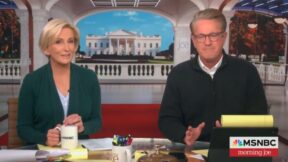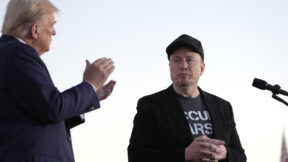CNBC Reports On Conservative Think Tank Warning Trump’s Tariffs Will Cost American Consumers Some 4 Trillion Dollars
CNBC’s Squawk Box reported Tuesday on the impact of former President Donald Trump’s proposed tariffs on the economy if he is reelected in November. Steve Liesman, a senior economic reporter at the network, broke down the numbers and said Trump’s tariffs would amount to a $3.9 trillion tax hike.
‘New estimates of the revenue raised from former President Trump’s proposed tariffs would make it potentially one of the biggest tax hikes in decades. And senior economics reporter Steve Liesman joins us with the details,” began host Joe Kernen.
“Yeah, the conservative American Enterprise Institute says the tariffs proposed by former President Trump, 20% on all imports to the U.S. across-the-board, would cost Americans as much as $3.9 trillion,” began Liesman referring to the conservative think tank. He added:
Kyle Pomerleau, a senior fellow at AEI, says that would amount to one of the biggest tax hikes since at least the 1980s. He says, “It would be like any other tax increase. It will have a negative impact on growth and employment, and also hurt U.S. exporters.”
Now, President Trump has said that the tariffs are paid by foreign companies and would boost U.S. growth by bringing manufacturing back to the U.S. Most economists from the right and the left disagree. In fact, conservative economists who find other parts of the Trump agenda — like tax cuts — will boost growth, say the tariffs could nearly offset all of those pro-growth policies and their benefits.
A paper by the conservative Cato Institute says, quote, “such aggressive protectionism would be extremely damaging to the economy and broader foreign policy goals.” Trump would have almost unilateral authority to enact these tariffs. Even while the Constitution gives Congress the sole authority to raise revenue, it has essentially ceded tariff authority to the executive branch over the decades.
Clark Packard of Cato tells me that all the president has to do is declare a national emergency, and he can implement any tariffs that he likes. The law doesn’t specify what constitutes a national emergency and courts have been reluctant to review such findings. Now, Packard says those tariffs can last a year. The president can just declare it again. Congress has the ability to override it but needs a veto-proof majority. Recent efforts by Congress to take the authority away from the president have failed. So, nothing stands in the way of President Trump and across-the-board 20% tariffs if that’s what he wants to do.
Trump’s tariff plan has long raised eyebrows, even within his own party. Senate GOP leader Mitch McConnell broke sharply with Trump during a press conference in September on the issue, saying, “Yeah, I’m not a fan of tariffs.”
“They raise prices for American consumers. I’m more of a free trade kind of Republican that remembers how many jobs are created by the exports that we engage in. And so I’m not a tariff fan,” added McConnell.
“You’ll find no serious, respected trade economists thinking that this is a good idea,” Ian Sheldon, a professor of Agricultural Marketing, Trade and Policy at The Ohio State University, told Business Insider on Wednesday. Other economists noted the policy would violate the Trump-brokered United States-Mexico-Canada Agreement (USMCA), which took the place of NAFTA in 2020.






